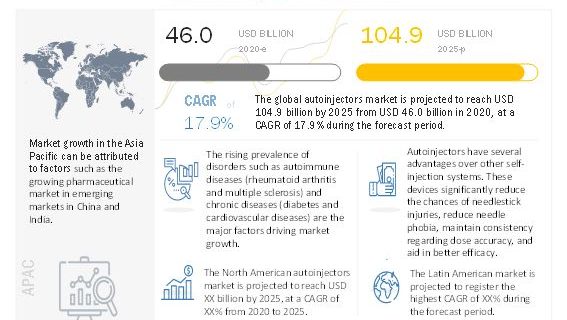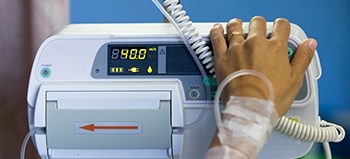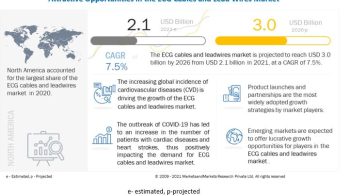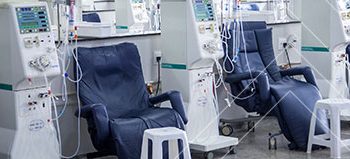
Expected Revenue Growth:
[180 Pages Report] The global autoinjectors market is projected to reach USD 104.9 billion by 2025 from USD 46.0 billion in 2020, at a CAGR of 17.9% from 2020 to 2025.
What This Report Will Provide?
This study involved four major activities in estimating the current autoinjectors market size. Exhaustive research was conducted to collect information on the market as well as its peer and parent markets.
The next step was to validate these findings, assumptions, and sizing with industry experts across the value chain through primary research. Both top-down and bottom-up approaches were employed to estimate the number of breast lesion localization procedures and the value market.
Major Growth Boosters:
Market growth is largely driven by the growing prevalence of targeted therapies, the rising incidence of anaphylaxis, rising preference for self-administration of drugs, usability advantages, the increasing number of regulatory approvals, the availability of generic versions of autoinjectors, favorable reimbursements and government support, and technological advancements.
Download PDF Brochure: https://www.marketsandmarkets.com/pdfdownloadNew.asp?id=173991724
COVID-19 Impact on The Autoinjectors :
The COVID-19 pandemic has resulted in a global healthcare crisis, causing a shift in healthcare delivery in most regions. Most non-essential procedures and in-hospital therapies were deferred in the first half of 2020 to prevent the spread of the infection and ease the toll on healthcare infrastructure.
Recent Developments :
- In August 2020, Antares Pharma (US) signed an agreement with Lunatus Global Medical Supplies (Dubai). In this agreement, Antares will supply packaged products to Lunatus and Lunatus will submit and obtain regulatory approval for XYOSTED in the UAE and Saudi Arabia as well as promote, market, and distribute XYOSTED in these two countries.
- In March 2020, SHL Medical (Switzerland) acquired Weibel CDS (Switzerland). This acquisition aimed at strengthening SHL Medical’s ability to provide more advanced drug delivery systems based on human-centered designs and functionality.
- In January 2020, Eli Lilly invested USD 470 million and created over 460 new jobs in Durham, NC. This expansion brought a new state-of-the-art pharmaceutical manufacturing facility to North Carolina’s research triangle park.
Frequently Asked Questions (FAQ):
- Which are the top industry players in the global autoinjectors market?
- What are the top trends in the autoinjectors market?
- Which autoinjectors market, by therapy, have been included in this report?
- Which geographical region is dominating in the autoinjectors market?
- Which is the leading therapy in the autoinjectors market?
Request Sample Report: https://www.marketsandmarkets.com/requestsampleNew.asp?id=173991724
Need to limit patient visits and physical contact :
The current COVID-19 pandemic has resulted in the implementation of a fresh set of protocols that aim to reduce patient visits to hospitals and clinics in non-emergency conditions to prevent both the transmission of the virus as much as make sure healthcare institutions are not overwhelmed. In this situation, the preference for home-use autoinjectors has risen among patients suffering from chronic illnesses and allergies. This also protects vulnerable high-risk populations from exposure to the virus during hospital visits.
Regional Growth Analysis:
Geographically, the autoinjectors market is segmented into North America, Europe, the Asia Pacific, Latin America, and Middle East & Africa. Growth in the Asia Pacific market is majorly driven by the large diabetes population and increasing healthcare expenditure which has drawn a number of major autoinjector device manufacturers to this region. These companies are increasing their presence in the Asia Pacific market through several approaches, such as establishing sales offices and partnering with local pharmaceutical companies.


